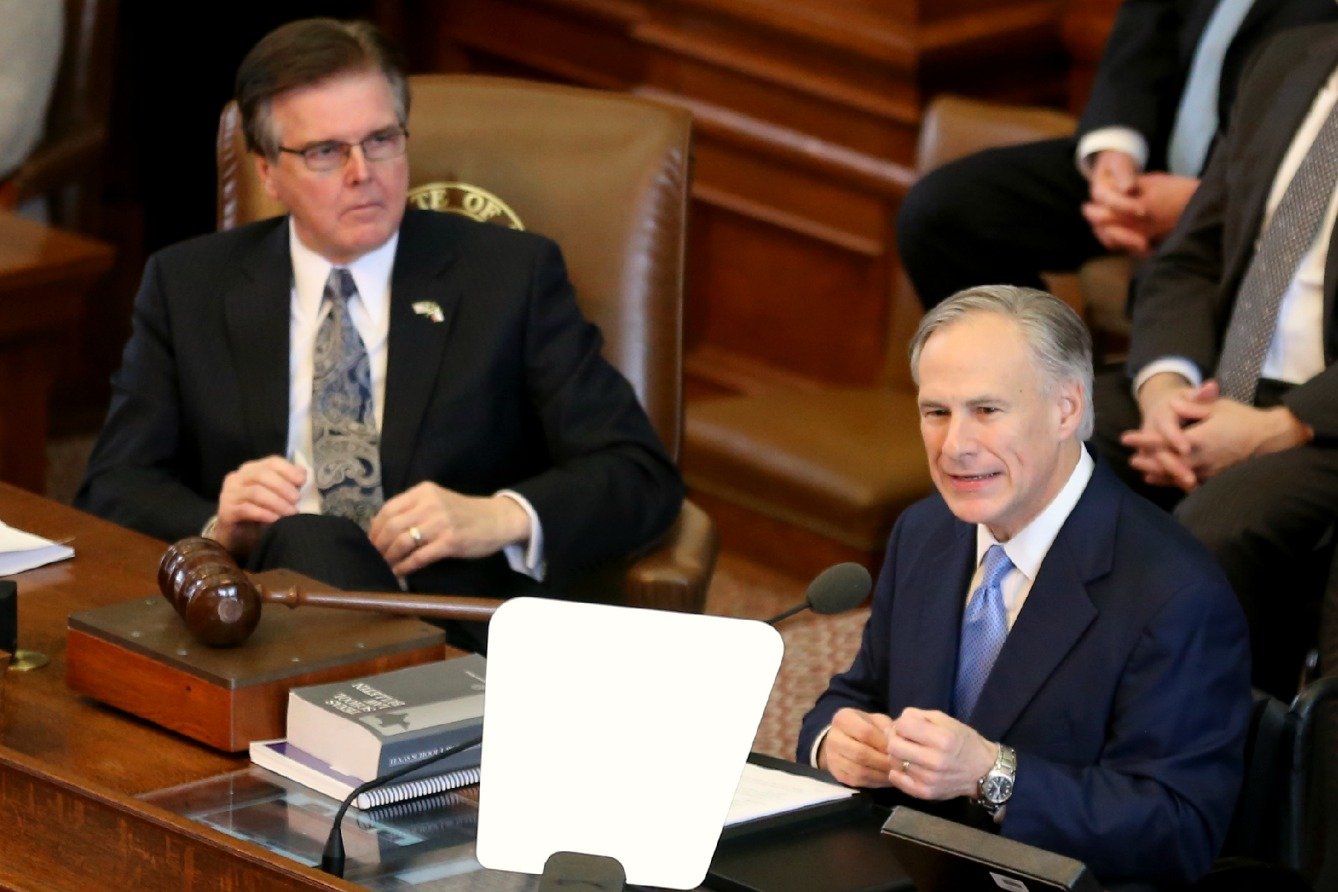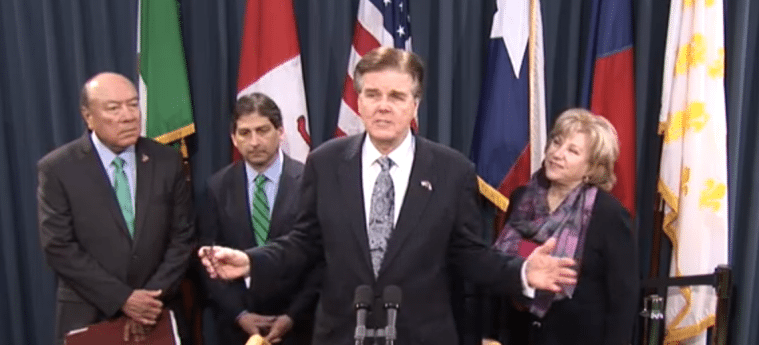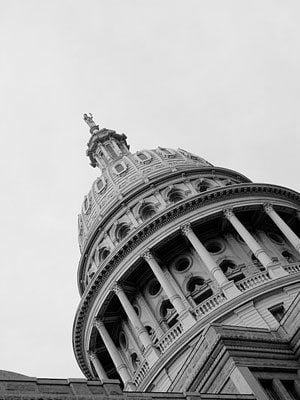
The Texas Senate Considers a Post-Tax Society—Then Reality Sets In

The problem with government is that it needs money to run, and that money has to come from somewhere. But people like money more than they like giving it to the government, which is held to be bad by a growing number of people. The social contract in general has taken a bit of a beating recently, thanks in part to successive generations of politicians who have promised the people that the government doesn’t need all that much money after all, and that if they make it to City Hall or the Legislature or Congress, they’ll take a lot less of that money, and schools and roads and fire departments will materialize from fairy dust.
So goes the 84th Legislature. Blessed with a decent surplus this year, legislators and new officeholders, who feel a strong need to reward their bases, are struggling to figure out how much they can offer in tax cuts. The zeal for cutting taxes is so intense that Lt. Gov. Dan Patrick and Gov. Greg Abbott have been outbidding each other like they’re at an auction—the former said $4 billion, the latter $4.4 billion, and now, thanks to the Senate, we’re at $4.6 billion. Other tax-cutting bills would push the number far above that.
But members of the Lege, including Patrick, are now coming to terms with the fact that they can’t fulfill the promises they’re making without shorting other budget needs or employing trick-budget math. At this point, it seems likelier that they’ll do either—or both—rather than back down on the size of their promised cuts.
This week included three hearings of the Senate Committee on Finance, responsible for most of the tax-cut agitation. The hearings amounted to a sort of tax-cutting roleplay in which Senators got to fulminate against the government’s power to raise revenue while they also expressed indignation and irritation at those, including a few Republicans, who urged the Lege to slow its roll.
Most of the talk centered around the slashing—and perhaps, the eventual abolition—of two taxes responsible for a lot of the state’s revenue, property taxes and franchise taxes. Property tax cuts are perhaps the most significant politically: Texans, and especially the kinds of Texans who voted Patrick and others into office, are mad as hell about their property tax bills.
Nelson acknowledged that the budget math was going to be “tight.”
Though the proposed property tax cuts would put a substantial dent in state government, they might amount to only $100 to $200 year for the average Texan. Still, emphasized state Sen. Kelly Hancock (R-North Richland Hills), that money means something to the “neediest among us.” State Sen. Paul Bettencourt (R-Houston) urged Senators to consider the compounding nature of those savings from year to year.
Democrats on the committee were skeptical of the cuts in general, but some are trying to push the Legislature to make “good” cuts—state Sen. Kirk Watson (D-Austin), for example, is pushing a larger homestead exemption. But even some Republicans on the committee expressed unease at the cuts. State Sen. Kel Seliger (R-Amarillo) worried that they would leave the state with too little revenue to make needed investments. But it was state Sen. Kevin Eltife (R-Tyler) who provided the strongest dissenting voice.
“I’m a numbers guy,” Eltife said. “I can’t vote for a tax cut without knowing how we’re going to pay for everything.” Eltife has already been singled out by conservative activists for his unwillingness to go all-in on tax cuts, so his outspoken reticence on Monday was notable. In particular, he worried that the tax cuts would leave too little room under the “spending cap,” the artificial constitutional restraint that limits how much the Lege can grow spending from biennium to biennium.
This year, the state has been promised additional revenue by the comptroller’s office that it can’t touch because of the spending cap—about $6 billion dollars, no small chunk of change. So legislators will either have to vote to violate the spending cap, which would be a very unpopular move with conservative activists, or find themselves constrained in the amount of money they can use this year. The tax cuts would take out a big chunk of that available money.
“My concern is that the money left under the spending cap won’t be enough to fill the needs of the state,” Eltife said. He asked Sen. Jane Nelson (R-Flower Mound), the chair of the finance committee, if she would would consider busting the spending cap for her tax cut package. She’d “consider anything,” she said. It was “ridiculous” that the budget rules treated tax cuts like normal spending, she added, for reasons that weren’t entirely explained.
But Nelson seemed piqued at the criticism, and other senators brusquely dismissed it. The critics were spoiling the party. “We have spent four weeks talking about spending needs,” Nelson said. “I would like three days for tax relief.” Was that so much to ask? Bettencourt warned his colleagues to fall back. “Elections have consequences,” he said. The governor had called for cuts. So grab the hacksaw and get in line. Still, Nelson acknowledged that the budget math was going to be “tight.”

The amendment, if it passed, would privilege tax cuts over other kinds of spending.
So on Wednesday, a gimmick descended. Evidently, Eltife had been talking to the leadership about his spending cap concern. Patrick, Nelson, Eltife and state Sen. Chuy Hinojosa (D-McAllen) held a press conference with a proposal: They’d ask the voters to approve a constitutional amendment allowing the Lege to use revenue above the spending cap to cut taxes or pay down debt. No other uses would be allowed.
“We have more money on hand than we believe any Legislature has ever had at one moment,” said Patrick. But “there is no support for exceeding the spending cap.” So they would ask the voters to bust the spending cap for them: “Gosh darn, we know our businesses and taxpayers need tax relief,” he said. “But because of the cap, we are limited in what we can do.”
The proposal makes a certain sense from the Democrats’ point of view—busting the spending cap probably means more money will go to state needs like education, even if Patrick wins his tax cuts. And it makes a certain sense for somebody like Eltife, who won’t have to stand in the way of tax cuts while other fiscal needs get attention, too.
But from Patrick’s POV, it’s a weirdly craven move. For one, he’s proposing to bust the spending cap—a sacred cow among conservatives—while saying loudly that he’s proposing to preserve it. And it contains a certain measure of political cowardice; if legislators wanted to, they could vote to bust the spending cap this session with a simple majority vote. Instead, they’re asking voters to make the hard choice for them, a move that seems eerily reminiscent of the dreaded Sacramento style of governance.
Furthermore, the amendment, if it passed, would privilege tax cuts over other kinds of spending. If the Lege ends up with $6 billion in additional revenue over the spending cap next session, it would virtually assure that that money would produce more tax cuts rather than, say, go back to schools or health care or roads.
These conversations are only possible because the state is experiencing relatively good times.
Finally, it’s a move that’s emblematic of Patrick’s emerging leadership style—impulsive, seemingly thought-up on the fly and done with little consultation with his legislative partners. House Speaker Joe Straus gave an exceptionally cool statement in response: “For 36 years our state spending cap has helped enforce fiscal discipline, and we should be very cautious about any attempt to weaken it.”
But Patrick’s proposal points to a reality about the new era in the Lege: Patrick and the generally suburban-oriented senators who represent the new vanguard are not amenable to government spending and value tax cuts above almost all else.
Indeed, the finance committee’s roleplaying session this week didn’t just focus on cutting taxes, but ending them in their current form. The Texas Public Policy Foundation’s Talmadge Heflin told the committee that its proposed property tax cuts would do “for now,” until the property tax could be abolished entirely. He would like to see it replaced by a big statewide sales tax, which would shift the state’s tax burden from the middle class to its lower class.
And senators talked a lot about dissolving the franchise tax. Almost everyone hates the franchise tax, including Democrats, but it produces some $4.7 billion in revenue every year. State Sen. Craig Estes (R-Wichita Falls) and others have filed bills that would kill the franchise tax at the end of this year, leaving a $9 billion hole in the state’s budget. Other proposals, including one filed by state Sen. Brandon Creighton (R-Conroe) would kill off the franchise tax by 2020, replacing it with, perhaps, yet more sales taxes.
Another TPPF analyst wowed the committee with his franchise tax talk. His “dynamic econometric model”—“We didn’t have those when I was in school,” said state Sen. Robert Nichols (R-Jacksonville)—showed that money would rain from the sky on Texas businesses if the Lege would just kill it off once and for all. And on Tuesday, senators got to boost their fiscal conservative credentials by talking up bills to kill minor taxes the comptroller’s office no longer wants, including one on sulphur producers. Another would repeal a 2 percent tax on fireworks collected for the benefit of rural fire departments.
These conversations are only possible because the state is experiencing relatively good times. But no economic boom lasts forever. When the “Texas Miracle” slows—an idea that seems inconceivable to many of the people running the state—we’re going to wonder where all of that past revenue went.
State government has underinvested in its basic responsibilities for years. Texas’ public education system is a national joke—the judge who found the school finance system unconstitutional recently warned an audience that the state is actively “dooming a generation of these children” through systematic, intentional and needless skinflintery. The roads are in bad shape, and haven’t kept pace with extraordinary population growth. Pension and health care funds for state employees are weak. Even the buildings that house state agencies are crumbling.
But come next year, Texans may have a little bit more cash in their pockets, which they can spend, perhaps, on cheaper fireworks. Let the good times roll!
Additional reporting by Kelsey Jukam


